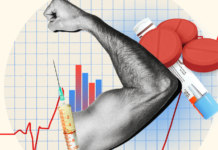ERECTILE DYSFUNCTION (ED)symptoms can throw a wrench into more than just your sex life. Your satisfaction may plummet, but it can also take a toll on your relationship with your partner (not to mention the toll it can take on your confidence).
It’s a disruption many men will experience at some point in their lives. In fact, a little over half of men will experience ED symptoms at some point throughout their lives. It’s not just a concern exclusive to older men, either. Contrary to popular belief, ED signs and symptoms can happen to any man at any age. According to a 2017 study in Translational Andrology and Urology, almost 8 percent of men ages 20 to 29, and 11 percent of men ages 30 to 39, experience ED symptoms.
It’s possible that these signs are actually performance anxiety—where your anxiety over performing well in bed hinders your ability to get hard. Regardless of the mechanism, struggling to get hard and stay hard can be embarrassing and cause issues in your relationship. Luckily, there are plenty of treatment options to relieve these symptoms.
It can feel difficult and embarrassing to talk to your doctor about your sexual functions. Again, this issue is incredibly common, and likely something your doctor deals with all the time. Plus, they’ve likely heard way more embarrassing stories.
Consider whether you’d rather not discuss it and deal with a limp dick or confidently address any erectile dysfunction symptoms you may be experiencing with a professional and get it resolved. Healthcare professionals, especially urologists, are trained to speak to patients about many kinds of sexual health and wellness concerns, so for the sake of your sexual performance and pleasure for both you and your partner, just do it.
Another thing: ED and its symptoms generally do not pop up out of the blue. In many cases, ED symptoms are the body’s way of telling you there is something else going on that may need to be addressed, explains S. Adam Ramin, M.D., medical director of Urology Cancer Specialists in Los Angeles. Below, everything you need to know about ED signs and symptoms.
What counts as ED?
According to Juan Andino, M.D., UCLA Urology Andrology & Infertility Fellow, it all comes down to one thing: Recurrence.
“Almost all men at some point experience an episode of what people will call ‘performance anxiety.’ That is to say, either due to alcohol, lack of sleep, a new partner, or stress they could have a less-than-satisfactory intimate experience. (See many harmless reasons you can’t get an erection here.)
But if difficulties with erections become a pattern, regardless of age, it is worth seeking out an evaluation with a doctor, ideally urologists who are focused on sexual medicine.
In a 2020 study of almost 400 men under age 40 who were evaluated at The Men’s Clinic at UCLA, the medical team found that 20 percent of patients had prediabetes or diabetes, 20 percent had low testosterone, and 11 percent had lab or physical exam findings suggestive of decreased fertility. In addition to helping treat the problem of ED, they found medical issues which could be improved to better a person’s health and prevent future issues with erectile function and overall health.
These signs point to the risk of ED. Here’s what to know.
ED symptoms to look out for
Trouble getting or maintaining an erection
It’s obvious, but these are the easiest signs to spot. Lowered libido can be a sign as well. If you’re regularly experiencing any of these, bring it up with your doctor. You might feel awkward when you start to talk about it, but getting a solution will feel a lot better than just worrying about it.
You haven’t woken up with morning wood in a while
Nighttime and early morning erections have nothing to do with feeling aroused: They happen because your brain releases less noradrenaline—a hormone that keeps erections from happening nonstop—during sleep.
Having frequent morning wood is a good thing, since it indicates the blood vessels that allow blood to flow to your penis are healthy, says Dr. Ramin.
If you start noticing that you’re waking up with an erection less often than usual, that could mean that those blood vessels aren’t working as well as they should—making it harder for blood to flow into your penis to become erect, Dr. Ramin says. That means the same issue impeding your morning wood might eventually rear up in the bedroom, when you’re actually trying to get hard.
Now, there’s no magic number that means you could be in trouble. It’s any amount that’s different than your normal that raises the red flag.
You don’t think about sex as much as you used to
If the stuff that usually gets you going just isn’t working anymore, there’s a good chance that your testosterone levels are lower than normal.
Testosterone is the main hormone responsible for your sex drive, explains New York-based urologist and sex expert David Shusterman, M.D. If it plummets, your desire to get going in bed may, too. And if you’re not really in the mood, getting hard will be next to impossible.
“It can be more helpful to reframe this and highlight that decreased libido and erectile dysfunction are the known sexual symptoms of testosterone deficiency or low testosterone,” explains Dr. Andino.
“A man experiencing ED may also have a decrease in libido due to an uncomfortable experience in the bedroom, but if the low libido is associated with ED and other symptoms are present like decreased energy, decreased motivation, difficulty gaining muscle and putting on weight, then it is important to seek out an expert evaluation to rule out a testosterone deficiency,” he says. Check out the sneaky signs of low testosterone here.
Unfortunately, some “men’s” or “wellness” clinics use testosterone labs in isolation to convince men they have a problem and sell them testosterone gels or injections, says Dr. Andino. Those therapies have issues of their own, such as potential loss of fertility. In order to avoid this, Dr. Andino recommends getting a testosterone test with a licensed doctor who has experience in sexual medicine. Find out more about getting a good testosterone test here.
Your cholesterol or blood pressure is high
The results from your annual physical’s lab work might hint that your erection is in danger. Two of the most common tells? High cholesterol and high blood pressure.
High total cholesterol is anything 240 milligrams per deciliter (mg/dL) or higher, and blood pressure should be 120/80 millimeters of mercury (mm Hg) or below. (One high BP reading probably isn’t a big deal. But more than two to three elevated readings over time likely means you have high blood pressure.)
Both high cholesterol and high blood pressure can damage your blood vessels, causing them to lose their elasticity. This makes it harder for the vessels to expand so more blood can flow into your penis, says Dr. Ramin. That in turn can make getting hard more difficult. “If the vessels can’t dilate, there won’t be enough blood flow to cause an erection,” he says.
Don’t assume this doesn’t relate to you: More and more millennials are clocking in with high blood pressure. Here’s why and what to do about it. Even if you’re not in that age group, it’s worth taking a look at the common causes of high blood pressure and what you can do about them.
Your gums are swollen, tender, or bleed easily
Gums that are swollen, painful, or bleed when you brush or floss are likely signs of gum disease. That doesn’t cause ED directly, but it can set off a chain of events that could create problems for your package, Dr. Shusterman explains.
That’s because gum disease can lead to inflammation throughout your body, which can damage your blood vessels. And if your blood vessels aren’t functioning properly, it’ll be tougher for blood to flow into your penis and make you hard.
You don’t get as hard as you used to—or you have trouble staying that way
You’re still getting hard enough for sex. But your penis still might be signaling an issue if you notice any kind of change to your erection—in fact, this can be the early stage of ED.
“It’s usually a slow, progressive problem,” Dr. Ramin says. “Initially, a patient might notice that his erections are not as firm, or that he isn’t able to maintain his erections for as long as before.”
There’s no cutoff level for how soft or short an erection has to be to signify a problem, though. It’s just about changes from your own personal norm, says Dr. Ramin. It’s probably not a big deal if it only happens once. But if you notice it happening frequently and you can’t think of a mental reason why you’d be having trouble getting hard (like you’ve been extra exhausted or stressed), that might be pointing to a bigger issue.
Other Things that Could Be Causing ED
You started a new prescription medication
Antidepressants and high blood pressure meds are particular culprits, says Dr. Ramin. Antidepressants like SSRIs (like Prozac or Paxil) and SNRIs (like Effexor and Cymbalta) can make it harder for hormones and chemical signals that make you feel aroused, like norepinephrine, to reach the brain, explains Dr. Ramin. And that lowered libido can make it harder to get an erection. Typically, you’d start to notice these symptoms within a couple weeks of starting the meds. Talk to your prescriber; often, there’s another medication with similar effects that you can use that doesn’t create this side effect for you.
When it comes to lowering blood pressure with meds, that’s essential for your overall health, but can be troublesome for your sex life. Lower BP means less blood flow to the arteries in your penis, which could mean trouble getting hard, Dr. Ramin says.
You’re suffering in the sleep department
No matter what’s stealing your shuteye, lack of sleep can lead to problems in the boner department. That may be especially true if you have sleep apnea, a sleep disorder where your breathing pauses frequently throughout the night.
Nearly 70 percent of guys who have sleep apnea also have ED, according to the International Society for Sexual Medicine.
Sleep deprivation causes testosterone levels to plummet and can make you feel more stressed or anxious, Dr. Shusterman explains. And all of those things can kill your libido and make it harder to get an erection.
You have kidney disease
Guys with kidney disease may also develop problems maintaining erections. That’s because medical conditions like these also impact hormone levels, blood circulation, and energy, according to the National Kidney Foundation. Or some guys lose interest in sex because because of the emotional and physical changes these conditions may cause.
However, men may regain their interest with time as they treat the initial kidney problems. But that’s not to say that all men with kidney problems will go on to experience ED. Taking prescribed medication, communicating with your doctor, and speaking with a psychologist can help guys maintain a healthy sex life.
How Is ED Diagnosed?
Dr. Andino always asks his patients who may be experiencing erectile dysfunction symptoms three questions:
- Has your erection been weaker? Is this causing difficulties with intimacy or sexual activities?
- Have you been able to keep an erection long enough for satisfying sex?
- Have you taken a pill to help with erections like Viagra or Cialis?
These are just a few prompts to think about that may help you in figuring out whether or not it is worth scheduling an appointment with your doctor to further discuss some potential treatment options. And remember that an occasional episode where an erection is not as hard as before or went away sooner than expected is usually not concerning, says Dr. Andino.
There’s no reason to feel embarrassed about needing medical intervention—ED is incredibly common. “For example, 50 percent of men who are 50 or older have ED. However, we also know that in some cases changes in erectile function can precede heart issues by 5 to 10 years. As the research from UCLA shows, even in young men, there can be medical issues that are identifiable and often reversible without requiring life-long medications.”
The bottom line is if erectile problems are recurrent, it is worth having an evaluation with a doctor, says Dr. Andino. “If risk factors are identified, these visits can be life-changing ultimately ensuring patients are optimizing their sexual function while promoting their overall health.”
How Is ED Treated?
Treatment for erectile dysfunction varies based on the individual. Some medications, such as certain anti-depressants and diuretics, may cause ED symptoms. According to Harvard Health, it is estimated that 25 percent of ED cases are caused by medications. In that case, your doctor may opt to switch up your prescriptions.
You may be prescribed an oral medication that will help you get and maintain an erection, such as sildenafil (Viagra), vardenafil (Levita), or tadalafil (Cialis). These drugs promote relaxation of muscles and increase blood flow to the area. These drugs do cause some medication interactions—be sure to share your medication list with your doctor so they can properly prescribe the best one for you. They can cause some side effects, such as headaches, digestive issues, vision problems, dizziness, low blood pressure, and prolonged erection (priapism).
Beyond medical therapy your doctor may suggest vacuum erection devices, penile injections, or a penile implant.
Can ED Be Prevented?
You can prevent ED by prioritizing living an overall healthy lifestyle. Here are a few things you can do to prevent ED, according to the National Institutes of Health:
- Quit smoking
- Avoid drinking too much alcohol
- Eat a well-balanced diet, filled with whole-grains, lean meats, and plenty of fruits and vegetables
- Maintain a healthy weight to prevent diabetes and high blood pressure
- Stay physically active
- Avoid illegal drugs




























